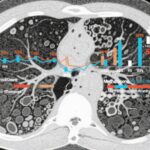Highlights
- Inavolisib plus palbociclib–fulvestrant significantly improved overall survival in PIK3CA-mutated, hormone receptor–positive, HER2-negative advanced breast cancer.
- The median overall survival increased by 7 months compared to placebo, with a hazard ratio for death of 0.67.
- Substantial increases in objective response rate and progression-free survival were observed.
- Adverse events such as hyperglycemia, stomatitis, gastrointestinal, and ocular effects were more frequent with inavolisib.
Clinical Background and Disease Burden
Hormone receptor–positive (HR-positive), human epidermal growth factor receptor 2 (HER2)-negative breast cancer represents the most common subtype of breast cancer. While endocrine therapy remains the mainstay of treatment, resistance—often due to acquired genetic mutations—limits long-term efficacy. One of the most frequent resistance mechanisms is mutation of the PIK3CA gene, which activates the PI3K/AKT/mTOR pathway, promoting tumor growth and survival. Up to 40% of HR-positive, HER2-negative advanced breast cancers harbor PIK3CA mutations, and these patients face poorer prognosis and limited options after endocrine therapy failure. Thus, targeted therapies addressing this pathway are an area of intense clinical investigation and unmet need.
Research Methodology
The INAVO120 trial (NCT04191499), a phase 3, double-blind, randomized study, enrolled patients with PIK3CA-mutated, HR-positive, HER2-negative locally advanced or metastatic breast cancer who experienced relapse during or within 12 months of completing adjuvant endocrine therapy. Eligible patients were randomly assigned to receive either:
- Inavolisib (a selective PI3Kα inhibitor) plus palbociclib (CDK4/6 inhibitor) and fulvestrant (estrogen receptor degrader), or
- Placebo plus palbociclib and fulvestrant.
The primary endpoint was progression-free survival (PFS); final analysis focused on overall survival (OS), with additional evaluation of objective response rates and safety.
Key Findings
A total of 161 patients received inavolisib-based therapy and 164 received placebo-based therapy. After a median follow-up of 34.2 months (inavolisib group) and 32.3 months (placebo group):
- Median overall survival was 34.0 months (95% CI, 28.4–44.8) in the inavolisib group versus 27.0 months (95% CI, 22.8–38.7) in the placebo group.
- The hazard ratio (HR) for death was 0.67 (95% CI, 0.48–0.94; P=0.02), meeting prespecified criteria for statistical significance (P<0.0469).
- Objective response rates were 62.7% (inavolisib) vs. 28.0% (placebo; P<0.001).
- The updated HR for disease progression or death was 0.42 (95% CI, 0.32–0.55), confirming a robust PFS benefit.
Safety findings indicated:
- Treatment discontinuation due to adverse events occurred in 6.8% of inavolisib patients versus 0.6% for placebo.
- Common inavolisib-associated adverse events included hyperglycemia, stomatitis/mucosal inflammation, diarrhea, and ocular toxicity (dry eye, blurred vision).
These results are consistent with phase 1/1b data (GO39374), where inavolisib with endocrine therapy showed manageable toxicity and promising activity even in pretreated populations, with objective response rates up to 25.9% and median PFS up to 7.3 months.
Mechanistic Insights and Biological Plausibility
PIK3CA mutations drive oncogenesis by constitutively activating the PI3K pathway, leading to enhanced tumor cell proliferation and survival. Inavolisib selectively inhibits the PI3Kα isoform, directly targeting this genetic vulnerability. The combination with palbociclib and fulvestrant synergizes by concurrently blocking cell cycle progression (CDK4/6 inhibition) and estrogen receptor signaling. Biomarker analyses confirm pharmacodynamic inhibition of PI3K pathway activity and reduction in circulating tumor DNA levels for PIK3CA mutations, supporting the observed clinical efficacy.
Expert Commentary
Dr. Nicholas Turner, a lead investigator, commented, “The INAVO120 trial establishes inavolisib as the first PI3K inhibitor to demonstrate a significant overall survival advantage in this genetically defined population, with a toxicity profile that appears more manageable than earlier agents.” Guidelines are likely to evolve as these results translate into practice, with the caveat of close monitoring for metabolic and mucosal side effects.
Controversies and Limitations
While the survival benefit is clinically meaningful, several limitations merit discussion:
- The trial population was restricted to patients with recurrence during or soon after adjuvant endocrine therapy, which may limit generalizability to all HR-positive, HER2-negative, PIK3CA-mutant advanced breast cancer patients.
- Adverse events, although mostly manageable, still led to significant discontinuation rates compared to placebo.
- Long-term outcomes and impact on quality of life require further study.
- Comparisons with other PI3K inhibitors (e.g., alpelisib) or next-line therapies are indirect and warrant head-to-head studies.
Conclusion
The INAVO120 trial marks a pivotal advance in the management of PIK3CA-mutated, HR-positive, HER2-negative advanced breast cancer. Inavolisib, when added to palbociclib and fulvestrant, delivers statistically and clinically significant improvements in overall survival and tumor response, with a safety profile that, while notable for metabolic and mucosal toxicities, is considered manageable in specialized settings. These data support the integration of inavolisib-based regimens into future treatment algorithms for this high-risk population, with ongoing need for patient selection, toxicity mitigation, and comparative effectiveness research.
References
1. Jhaveri KL, Im SA, Saura C, Loibl S, Kalinsky K, Schmid P, Loi S, Thanopoulou E, Shankar N, Jin Y, Stout TJ, Clark TD, Song C, Juric D, Turner NC. Overall Survival with Inavolisib in PIK3CA-Mutated Advanced Breast Cancer. N Engl J Med. 2025 Jul 10;393(2):151-161. doi: 10.1056/NEJMoa2501796 IF: 78.5 Q1 .
2. Bedard PL, Jhaveri KL, Accordino MK, Cervantes PA, Gambardella V, Hamilton E, Italiano PA, Kalinsky PK, Krop PIE, Oliveira M, Schmid PP, Saura C, Turner PN, Varga A, Cheeti S, Dey A, Hilz S, Hutchinson KE, Jin Y, Royer-Joo S, Peters U, Shankar N, Schutzman JL, Aimi J, Song K, Juric D. Inavolisib plus letrozole or fulvestrant in PIK3CA-mutated, hormone receptor-positive, HER2-negative advanced or metastatic breast cancer (GO39374): An open-label, multicentre, dose-escalation and dose-expansion phase 1/1b study. Eur J Cancer. 2025 May 15;221:115397. doi: 10.1016/j.ejca.2025.115397 IF: 7.1 Q1 .
3. Turner NC, Im SA, Saura C, Juric D, Loibl S, Kalinsky K, Schmid P, Loi S, Sunpaweravong P, Musolino A, Li H, Zhang Q, Nowecki Z, Leung R, Thanopoulou E, Shankar N, Lei G, Stout TJ, Hutchinson KE, Schutzman JL, Song C, Jhaveri KL. Inavolisib-Based Therapy in PIK3CA-Mutated Advanced Breast Cancer. N Engl J Med. 2024 Oct 31;391(17):1584-1596. doi: 10.1056/NEJMoa2404625 IF: 78.5 Q1 .


